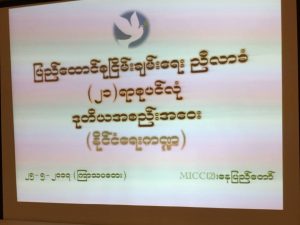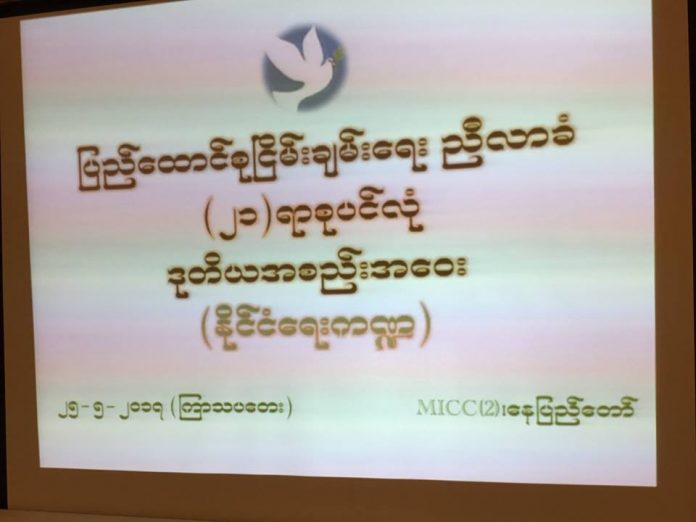Mon political parties attending national peace talks in Naypyitaw this week are balking at the government’s insistence on including “non-secession from the union” as one of the guiding principles of the talks.
The Mon parties joined other minority ethnic representatives to criticize what they say is a violation of the original 1947 constitution, which allowed minority groups the right to secede after 10 years. The phrase created something of an impasse on the second day of the 21st Century Panglong Peace Conference, but ethnic and military leaders say they will work to find middle ground.
“Mon National Party submits that the use of the phrase ‘non-secession from the union’ violates the 1947 constitution and we are against it,” said Nai Layie Tamarh, general secretary of Mon National Party.

Representatives cited Article X of the 1947 Burma (Myanmar) constitution: “…every state shall have the right to secede from the Union in accordance with the conditions hereinafter prescribed.”
“If they that phrase is included in the final document, it will only serve to increase the concerns and doubts of the oppressed minority ethnic peoples. It will affect national unity and reconciliation, and tarnish the current talks,” said Nai Layie Tamarh.
The conference is split into five sectors, each discussing a different aspect of the process. Military representatives to the political sector, who are largely independent of the National League for Democracy-led government, are the only group pushing the non-secession language. Political parties, armed ethnic groups and some scholars have advised against it.
The political sector is discussing language used by the Union Peace Dialogue Joint Committee (UPDJC), a tripartite organization composed of the government, some armed groups, and political parties. The guiding principles for the negotiations had called for the establishment of a “Union based on the principles of democracy and federalism,” that upholds “the non-disintegration of the Union, the non-disintegration of national solidarity, and perpetuation of national sovereignty.” The military recently moved to change the first principle to “non-secession.”
Nai Chain Toi, the leader of the other major Mon political party, the All Mon Regions Democracy Party (AMDP) also rejects the non-secession language.
“Just because they are talking about building a federal union, does not mean it will be genuine federalism. Whether the result of this framework for negotiations is true federalism depends on what is decided.”
The political parties of other ethnic groups also announced their opposition to the non-secession language. The Shan Nationalities League for Democracy (SNLD), one of the largest ethnic parties in the country, said in a statement issued on May 25 that the new term totally violates the promise and spirit of the original Panglong agreement. They added that it is not what Myanmar’s independence leader General Aung San had intended by the original agreement, and would destroy national unity.
The five sectors being discussed at the second round of peace talks are politics, economy, society, land and resources, and security. After two days of discussion, results from each sector will be submitted to the full conference for further discussion and deliberation on May 28.

